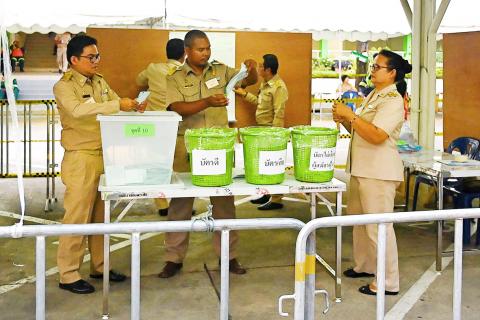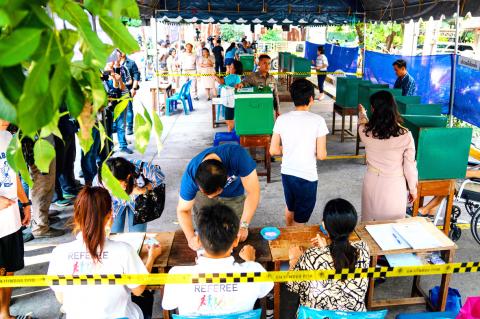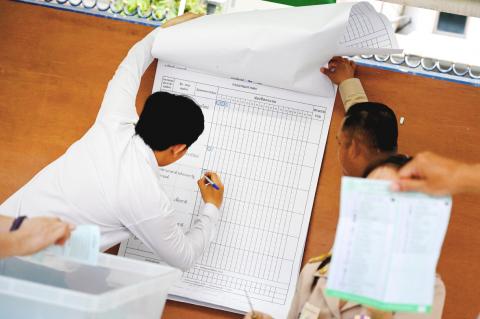Nearly five years after a coup, Thailand yesterday voted in a long-delayed election pitting a military-backed party against the populist political force the generals overthrew.
An opinion survey taken in the days before the election, and released after voting closed, indicated that the governing party ousted in the 2014 coup would win the most parliamentary seats, but not enough to govern alone.
A military-backed party would win the second-highest number of seats, the Suan Dusit survey found.

Photo: AFP
Thai Prime Minister Prayuth Chan-ocha, who led the coup, is hoping to extend his hold on power after engineering a new political system that aims to stifle the influence of big political parties not aligned with the military.
Voting stations closed at 5pm and meaningful results were expected within several hours, but the formation of a new government, likely to be unstable and short-lived, could take weeks of haggling.
About 51 million Thais were eligible to vote. Leaders of political parties opposed to military rule urged a high turnout as the only way to derail Prayuth’s plans.

Photo: Bloomberg
Prayuth was among the first to vote in Bangkok, arriving in a black Mercedes after polling booths opened at 8am.
“I hope everyone helps each other by going to vote today as it’s everyone’s right,” he told reporters after voting.
He played golf later in the morning before heading to an army base to await results.

Photo: AFP
The election is the latest chapter in a nearly two-decade struggle between conservative forces including the military and the political machine of former Thai prime minister Thaksin Shinawatra, a tycoon who upended tradition-bound Thailand’s politics with a populist political revolution.
Thaksin was ousted in a 2006 military coup and now lives in exile abroad to avoid a prison term, but parties allied with him have won every election since 2001.
His sister, former Thai prime minister Yingluck Shinawatra, who led the government that was ousted in 2014, also fled the country after what supporters said was a politically motivated corruption prosecution.
Just days before yesterday’s election, the Thaksin-allied Pheu Thai party said the houses of party officials and its campaign canvassers in some provinces were searched by military personnel in an act of intimidation.
The party’s leader, Sudarat Keyuraphan, said after voting in Bangkok’s Ladprao District that she was confident of winning.
“I don’t say it’ll be a landslide. I don’t know. Depends on the people, but I think we can win this election,” she said.
First-time voter Napasapan Wongchotipan said she hopes for positive changes after the election.
“I have no idea what the results will be like,” she said. “But I do wish that the party that we will get, the party that wins the votes, will come in and improve our country.”
Thais were voting for a 500-seat parliament that along with a 250-member junta-appointed Senate will decide the country’s next prime minister.
That setup means a military-backed figure such as Prayuth could become leader even while lacking a majority in parliament.

The CIA has a message for Chinese government officials worried about their place in Chinese President Xi Jinping’s (習近平) government: Come work with us. The agency released two Mandarin-language videos on social media on Thursday inviting disgruntled officials to contact the CIA. The recruitment videos posted on YouTube and X racked up more than 5 million views combined in their first day. The outreach comes as CIA Director John Ratcliffe has vowed to boost the agency’s use of intelligence from human sources and its focus on China, which has recently targeted US officials with its own espionage operations. The videos are “aimed at

STEADFAST FRIEND: The bills encourage increased Taiwan-US engagement and address China’s distortion of UN Resolution 2758 to isolate Taiwan internationally The Presidential Office yesterday thanked the US House of Representatives for unanimously passing two Taiwan-related bills highlighting its solid support for Taiwan’s democracy and global participation, and for deepening bilateral relations. One of the bills, the Taiwan Assurance Implementation Act, requires the US Department of State to periodically review its guidelines for engagement with Taiwan, and report to the US Congress on the guidelines and plans to lift self-imposed limitations on US-Taiwan engagement. The other bill is the Taiwan International Solidarity Act, which clarifies that UN Resolution 2758 does not address the issue of the representation of Taiwan or its people in

US Indo-Pacific Commander Admiral Samuel Paparo on Friday expressed concern over the rate at which China is diversifying its military exercises, the Financial Times (FT) reported on Saturday. “The rates of change on the depth and breadth of their exercises is the one non-linear effect that I’ve seen in the last year that wakes me up at night or keeps me up at night,” Paparo was quoted by FT as saying while attending the annual Sedona Forum at the McCain Institute in Arizona. Paparo also expressed concern over the speed with which China was expanding its military. While the US

SHIFT: Taiwan’s better-than-expected first-quarter GDP and signs of weakness in the US have driven global capital back to emerging markets, the central bank head said The central bank yesterday blamed market speculation for the steep rise in the local currency, and urged exporters and financial institutions to stay calm and stop panic sell-offs to avoid hurting their own profitability. The nation’s top monetary policymaker said that it would step in, if necessary, to maintain order and stability in the foreign exchange market. The remarks came as the NT dollar yesterday closed up NT$0.919 to NT$30.145 against the US dollar in Taipei trading, after rising as high as NT$29.59 in intraday trading. The local currency has surged 5.85 percent against the greenback over the past two sessions, central